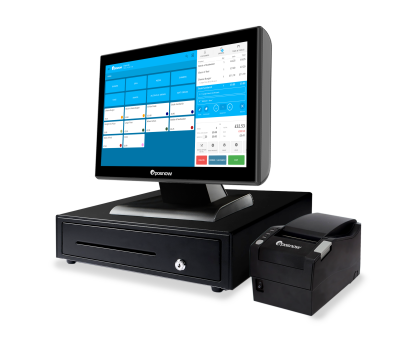Kitchen Management 101: Everything You Need To Learn
You don't always need a degree in the culinary arts to successfully manage a kitchen. With the right guidance and some know-how, you can become an efficient kitchen manager in no time.
The restaurant industry depends on kitchen managers to keep operations running smoothly and efficiently. To do this, kitchen managers must be knowledgeable about all aspects of kitchen management, from the safety of your food to restaurant laws, staff scheduling to budgeting, and kitchen maintenance.
By the end of this complete guide to kitchen management, you'll have the know:
-
The role of a kitchen manager in the hospitality industry and how it differs from chefs and restaurant owners.
-
How to effectively manage a kitchen
-
the best kitchen management software
-
How to create a business plan and kitchen layout
Let's get started.
What is Kitchen Management?
Kitchen management is the art and science of managing a kitchen in a restaurant or food service setting. This can include bar management, cafe management, and fast food management. This involves overseeing the back-of-house operations, developing kitchen procedures, managing kitchen staff, and controlling kitchen costs. Kitchen managers are expected to ensure that everything runs smoothly by consistently providing quality customer service and high standards of cleanliness.
Kitchen manager vs. chef
What's the difference between kitchen managers and chefs? Kitchen managers are responsible for seeing the day to day kitchen operations and general administrative tasks, while chefs focus on the creative process of cooking, including recipe management and food prep. An Executive chef prepares and cooks meals while kitchen managers oversee kitchen staff, kitchen cleanliness, kitchen costs, and kitchen schedules.
Kitchen manager vs. restaurant owner
While a restaurant owner is primarily responsible for the overall success of their business, kitchen managers play an integral role in keeping operations running smoothly and carrying out administrative tasks. Kitchen managers work to ensure that food safety and quality standards are met while controlling costs and working with staff to create efficient processes. Owners rely on kitchen managers to handle the food service operation of the kitchen so they can focus on the big picture.
What do kitchen managers actually do?
Let's take a closer look at a kitchen manager's job description, including duties and responsibilities:
-
Ensuring staff follow restaurant kitchens policies and procedures
-
Checking the food quality and the quality of kitchen supplies
-
Supervising kitchen staff to ensure they are following kitchen standards
-
Creating kitchen plans, deciding on menu items, and budgeting
-
Creating training programs for new employees in food safety laws, safe food preparation techniques, and kitchen protocol
-
Monitor staff members' performance and motivate employees
-
Maintaining kitchen cleanliness, food waste, and safety standards
-
Ordering kitchen supplies and managing kitchen inventories
-
Managing kitchen budgets, kitchen schedules, and kitchen and food cost and menu management
-
Developing kitchen plans and creating a kitchen layout
-
Ensuring compliance with health codes, restaurant laws, and other regulations related to the kitchen
Choosing a management style as a kitchen manager
Different managers have different management styles. It's important to determine which style works best for them and all the employees they manage. Some common management styles include:
Democratic management styles:
-
Consultative: kitchen managers take kitchen staff opinions and ideas into account when making decisions.
-
Collaborative: kitchen managers provide kitchen staff with opportunities to collaborate on decisions.
-
Participative: kitchen managers allow kitchen staff to take part in the decision-making process.
Autocratic management styles:
-
Authoritative: kitchen managers make kitchen decisions without consulting kitchen staff.
-
Persuasive: kitchen managers use persuasive tactics to convince kitchen staff to accept kitchen decisions.
-
Paternalistic: kitchen managers act in a parental and protective role toward kitchen staff members
Laissez-faire management styles:
-
Delegative: kitchen managers delegate kitchen tasks to kitchen staff and give them the freedom to accomplish kitchen tasks without interference.
-
Trust-based: kitchen managers trust kitchen staff to complete kitchen tasks without providing guidance or oversight
-
Visionary: kitchen managers provide kitchen staff with a clear vision for a busy restaurant operations and encourage kitchen staff to pursue kitchen goals.
In addition to these duties, kitchen managers may be responsible for hiring kitchen staff, resolving kitchen conflicts, customer complaints, creating kitchen reports, and helping the kitchen team achieve their goals.
How to effectively manage a kitchen
Effective kitchen management requires commitment, attention to detail, and strong leadership skills. Here are some tips for restaurant kitchen managers on how to effectively manage a kitchen
#1 Communicate with kitchen staff
Communication is key in the restaurant industry, so it's important for kitchen managers to stay in touch with kitchen staff, keep kitchen staff informed, and provide kitchen staff with clear instructions.
Here are some tips for effective kitchen staff communication:
-
Hold regular kitchen meetings: Regular kitchen meetings with kitchen staff can help create an open and collaborative kitchen environment.
-
Be clear in your instructions: Make sure kitchen staff understand the tasks at hand by providing them with clear instructions and expectations.
-
Provide feedback: Provide kitchen staff with constructive feedback to help them improve their performance.
-
Set goals: Set kitchen goals with kitchen staff to help motivate employees.
-
Reward kitchen staff for their efforts: Show kitchen staff that you appreciate their hard work by rewarding them for a job well done.
#2 Keep calm under pressure
Kitchen management can be stressful at times, and kitchen managers need to stay calm in order to effectively manage kitchen operations. Here are some tips for kitchen managers on how to keep calm under kitchen pressure.
-
Take a deep breath: Taking a moment to take a few deep breaths can help kitchen managers maintain their composure and focus on kitchen tasks.
-
Stay focused: Stay focused on kitchen tasks and try not to get distracted by kitchen drama or kitchen conflicts.
-
Have a plan: Have a kitchen plan in place and know what kitchen steps to take in order to resolve kitchen issues quickly and efficiently
-
Keep perspective: When faced with kitchen challenges, remember that it's just kitchen work and that it's important to keep kitchen matters in perspective.
#3 Be detailed-orientated
Kitchen management requires kitchen managers to pay attention to kitchen details and take kitchen tasks seriously. Here are some tips for kitchen managers on how to be detail-oriented
-
Organize kitchen tasks: Make sure kitchen staff have clear instructions and expectations when it comes to kitchen tasks.
-
Inventory management: Monitor kitchen inventory control levels and ensure kitchen staff has the kitchen supplies they need to complete kitchen tasks.
-
Create kitchen reports: Create kitchen reports that document kitchen performance, kitchen trends, and kitchen events.
-
Pay attention to kitchen safety: Monitor kitchen safety procedures and make sure kitchen staff follow proper kitchen safety protocols.
#4 Invest in the best kitchen equipment
Investing in proper equipment is essential for kitchen managers to help kitchen staff complete kitchen tasks quickly and efficiently. Here are some tips for kitchen managers on how to invest wisely in kitchen equipment.
-
Research kitchen equipment: Research kitchen equipment and find out which kitchen equipment will best suit the needs of your restaurant's kitchen.
-
Consider kitchen space: Consider kitchen space and make sure kitchen equipment is not taking up too much kitchen space
-
Purchase quality kitchen equipment: Purchase kitchen equipment that is of high quality in order to ensure kitchen safety and efficiency
-
Train kitchen staff on kitchen equipment use: Make sure kitchen staff are trained properly on equipment use and kitchen safety protocols
Kitchen management is a complex task but with careful planning, clear communication, attention to detail, and quality kitchen investments, you can create an efficient kitchen environment for your restaurant staff.
#5 Be creative
Kitchen management requires managers to be creative when it comes to their kitchen manager duties. Here are some tips on how to think creatively.
-
Brainstorm kitchen ideas: Brainstorm kitchen ideas with kitchen staff and come up with new kitchen recipes or new dishes.
-
Encourage kitchen experimentation: Encourage kitchen staff to experiment with kitchen ingredients and kitchen techniques in order to create unique kitchen dishes.
-
Involve kitchen staff: Involve kitchen staff when it comes to kitchen decisions and allow them to contribute their kitchen ideas and opinions.
-
Try new kitchen trends: Keep up with kitchen trends and try out new kitchen ingredient combinations or cooking techniques.
Being creative in kitchen management can help you come up with innovative kitchen ideas and dishes, which can make the restaurant stand out from the competition.
#6 Design and implement a successful kitchen layout
Kitchen layout is an important part of kitchen management. Here are some tips for kitchen managers on how to ensure a well-organized and efficient kitchen layout:
-
Define the main kitchen activities: Determine which tasks will take place in each area of the kitchen and assign specific areas for each task.
-
Consider traffic flow: Make sure there is a clear and unobstructed traffic flow in the kitchen space for kitchen staff to move around without difficulty.
-
Optimize workstations: so that kitchen staff can have enough room to complete their tasks efficiently.
-
Choose adequate lighting: Choose adequate lighting for each area of the kitchen and ensure there are no blind spots or dark areas in the kitchen.
-
Organize kitchen tools: Organize kitchen tools, ingredients, and utensils in designated areas for easy access.
Kitchen layout is essential for successful kitchen management as it plays a role in how efficient and productive the kitchen operations are. Proper planning of the kitchen layout helps ensure that the entire team can work without any unnecessary hindrances. Be sure to take the time to plan out their kitchen layout carefully and make sure that it is practical, efficient, and safe.
#7 Pay close attention to guest satisfaction
Kitchen management also includes paying attention to guest satisfaction. Here are some tips for kitchen managers on how to ensure that guests are satisfied with their dining experience:
-
Maintain quality standards: Maintain high-quality standards when it comes to preparing food and serving guests.
-
Train kitchen and wait staff on customer service: Train kitchen and wait staff on effective customer service techniques, such as being friendly, courteous, and accommodating to customers.
-
Pay attention to details: Pay attention to small details like presentation, plate garnishes, etc., which can help improve the guest experience.
-
Stay up-to-date on kitchen trends: Stay up-to-date on current food trends in order to offer guests interesting culinary options.
-
Monitor feedback: Monitor customer feedback, whether it's from online reviews or in-person comments, to help identify areas for improvement.
Creating a positive dining experience for restaurant guests is essential for success. Ensure all kitchen activities are designed with guest satisfaction in mind. By paying attention to the details and being proactive with customer feedback, you can ensure that every guest leaves with a great experience.
What to include in your kitchen business plan:
Now that you know the basic kitchen management tips, you need to create a kitchen business plan that outlines your kitchen goals and objectives. This should include:
An executive summary:
An executive summary of your kitchen business plan serves as a high-level overview of your kitchen business plan and should include kitchen management strategies, kitchen operations goals, kitchen team structure, kitchen equipment purchases, kitchen safety protocols, and kitchen marketing plans.
A business introduction:
A business introduction to kitchen management should always start with the basics: your restaurant name, its values, kitchen mission, and kitchen vision and concept and sample menu.
When coming up with your kitchen's concept, you should keep it as straightforward and simple as possible. This is the kitchen's foundation and should clearly explain what you are offering, to whom, and why.
For example: "We offer fast-casual Thai food with a focus on fresh, locally-sourced and organic ingredients."
Financial projections:
Your kitchen business plan should also include financial projections. This includes kitchen startup costs, equipment and supply purchases, kitchen staff wages, kitchen overhead expenses, kitchen marketing budget, food cost, and kitchen profit forecasts.
Legal considerations:
The kitchen business plan should also include legal considerations such as kitchen licensing and kitchen insurance plans. For example, kitchen managers should research kitchen laws and kitchen regulations in their state or country, as well as kitchen safety protocols, kitchen fire safety plans, and kitchen food handling guidelines.
Marketing analysis and plan:
This part of your business plan should include the following:
-
Marketing analysis: kitchen managers should conduct a kitchen marketing analysis to determine kitchen target audiences, kitchen competition, and kitchen trends.
-
Target market: kitchen managers should decide who kitchen target customers are, what kitchen needs they have, and how kitchen products and kitchen services will meet those kitchen needs.
-
SWOT analysis: kitchen managers should also conduct a kitchen SWOT analysis that identifies kitchen strengths, kitchen weaknesses, kitchen opportunities, and kitchen threats.
-
Price analysis: kitchen managers should decide on kitchen pricing strategies and kitchen discounts and promotions.
-
Marketing plan: kitchen managers should create kitchen marketing plans that outline kitchen goals, kitchen objectives, kitchen tactics, kitchen timeline, kitchen budget, and kitchen measurements for success.
Having a comprehensive kitchen business plan will help you stay organized and on track when it comes to kitchen management and kitchen operations. With the right kitchen management strategies and kitchen team structure, you can be sure your kitchen will be successful!
Kitchen management software for your:
Using kitchen management software can help kitchen managers more effectively manage kitchen operations. Here are some software tools that you should consider:
#1 Restaurant POS systems
Restaurant POS systems are essential for efficient kitchen management. They provide restaurant owners with powerful tools to manage food orders, track sales, and track inventory in real time.
POS systems also integrate with third-party apps, which allow businesses to access customer data, store loyalty programs, and payment processing. Some apps include:
-
Multi-site manager: This is an ideal tool for restaurant business owners who manage multiple locations. It helps to streamline and automate processes, provides real-time insights into performance across all sites, and gives you control over stock management, manpower allocation, and more. This feature can also be useful in retail management and store management.
-
Order & Pay: Suppose you want to offer customers the ability to order and pay for their meals through their mobile devices. With this app, you can set up self-serve kiosks with integrated payment options that make it easier for customers to purchase items.
-
Delivery: Food delivery is a growing trend, and you can use delivery apps to manage orders from third-party services like Uber Eats, Deliveroo and DoorDash. These apps also help you track deliveries, optimize routes and manage customer feedback.
-
Analytics: This type of software helps restaurant management gain valuable insights into kitchen performance. Analytical tools aim to uncover patterns, trends, and correlations between customer orders, kitchen operations, and sales.
-
Accounting: Accounting software helps restaurant managers track income and expenses and manage payroll. This type of software integrates with hospitality and retail POS systems to generate sales reports, profit and loss statements, and other financial documents.
-
CRM: A customer relationship management (CRM) system helps restaurant managers build better relationships with customers by tracking their order history, preferences, and contact details. For example, an automated CRM tool can be used to send personalized emails, text messages, or push notifications to customers.
By leveraging the right kitchen management systems, you can improve operations, reduce costs, increase profits and create an exceptional customer experience.
#2 KDS kitchen display systems
A kitchen display system (KDS) enables kitchen staff to quickly and easily view kitchen orders on a digital kitchen monitor. It helps kitchen staff view kitchen orders quickly and accurately, so that kitchen orders are completed on time.
#3 Payment processing systems
A kitchen payment processing system allows kitchen staff to quickly and securely process kitchen payments. It can also help keep track of kitchen transactions and kitchen revenue.
By utilizing kitchen management systems, you can ensure that kitchen operations run smoothly and efficiently. With the right kitchen management software, kitchen managers can save time and energy while improving kitchen performance and kitchen profitability.
TIP: Check out our hospitality POS systems and payment processing services today!
#5 Social media platforms
Social media platforms help to promote the restaurant or hospitality business. You can use social media platforms to showcase kitchen specials and promotions, create engaged communities of kitchen customers, and build an online presence for the business.
#6 Website hosting platforms
Creating a website for the restaurant or hospitality business is also essential. You can use website hosting platforms to create an online presence, showcase kitchen menus, food offerings and services, and allow kitchen customers to make reservations or place orders online.
Final Thoughts
So there you have it. Kitchen Management 101 is everything you need to know about running a successful kitchen business. Whether it's your first time starting a restaurant business or you're an experienced kitchen manager, all the advice and tips provided in this blog post can help you run a successful kitchen business.
From researching the concept of your restaurant to creating financial projections, legal considerations, and marketing plans to finding the best kitchen management software for your needs, with the right knowledge and strategies, you can ensure that your restaurant is successful.
Good luck on your restaurant journey!





